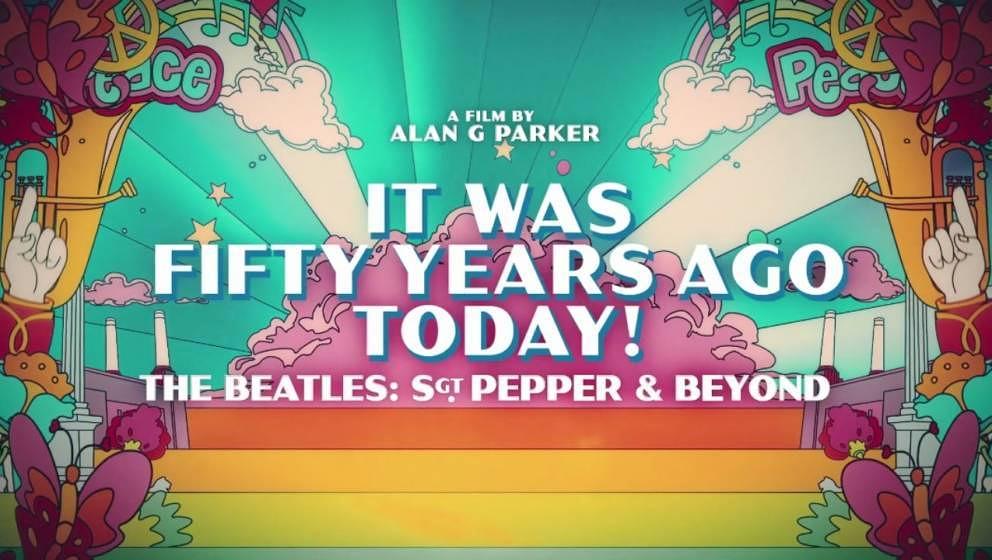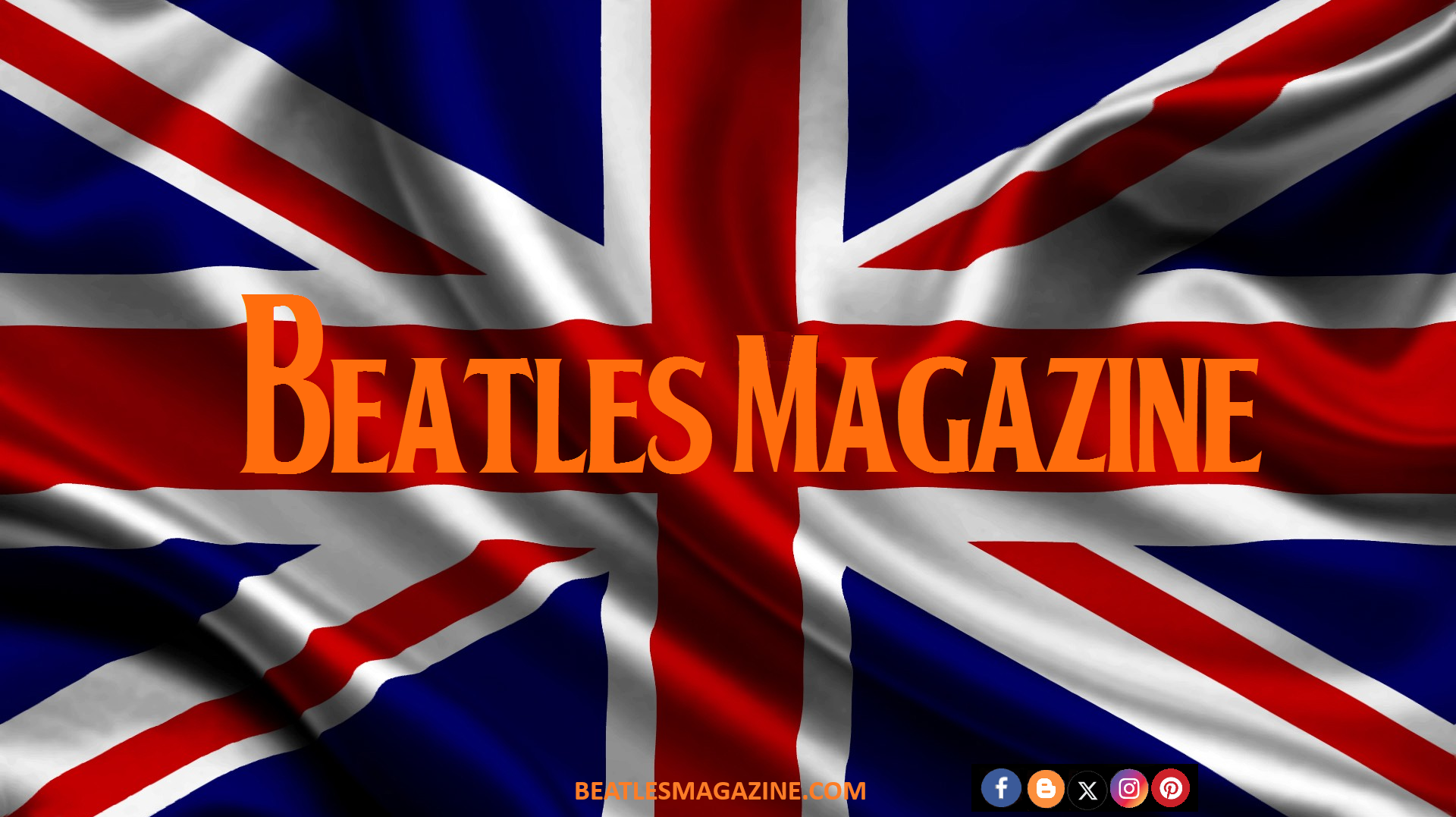Beatles Magazine set out to get the backstory for Alan G. Parker’s wonderful documentary, It Was Fifty Years Ago Today: Sgt. Pepper & Beyond. Parker has given us a fine list of credits including, Monty Python: Almost The Truth, Hello Quo!, Who Killed Nancy?, and Rebel Truce: The History of the Clash. Parker mixes a keenly developed filmmaker’s eye with the heart of a fan. Unseen footage and first hand accounts mesh together for a fun and enlightening account. If you love the Beatles, Sgt. Pepper’s Lonely Hearts Club Band, and sixties culture, you are in for a delightful viewing.
BM: Can you describe when you first became aware of the Beatles? What effect did they have on you?
Alan Parker: I think looking back I’d been waiting for The Beatles or something like them to happen for a while, a band that would be bigger than just a band, that would include friendship, travel, all kinds of possibilities. I was born and raised in Blackburn, Lancashire, so Liverpool was pretty close. Once I started to travel there regularly I also started to meet new people and get involved more. It’s quite hard to believe looking at me now, but I was badly bullied as a young kid, and The Beatles/Lennon were kind of like my safety blanket. ‘4000 Holes in Blackburn, Lancashire wasn’t lost on me, and at one point I thought ‘Nowhere Man’ was written about me.
BM: Events that transpired touring in the Philippines and in America’s South took a heavy toll on the group. Can you describe what happened that was displayed in the documentary’s footage?
Alan Parker: They got a rough ride in the Philippines, no two ways about that, they (or in reality some of Brian Epstein’s staff) turned down a lunch with Marcos and everything else escalated around that! None of it was their fault at all, but they paid big for it, they even lost their gig fees! In the movie we were lucky enough to find some unseen press footage, where John actually says he’d never go back again. With touring taking a heavy toll on them I think it was the straw that broke the camels back.
BM: How revolutionary was it for a band like the Beatles to cease touring? How did this effect what they were doing in the studio?
Alan Parker: By the time they hit late summer 1966 they couldn’t hear a thing on stage, nor could they be heard. As Ringo said later “People came to see The Beatles” I think they felt a bit like exhibits A, B, C & D… And that can never be good for a creative situation, walking away was a big step, but I think they were savvy enough to know that even if they lost some of their core audience they were big enough to stand that, and of course a change in direction musically would pick up new fans along the way too.
 BM: Brian Epstein has often been overlooked in telling the story of the Beatles. Can you tell us a little bit about Brian’s life, and his impact in the Beatles?
BM: Brian Epstein has often been overlooked in telling the story of the Beatles. Can you tell us a little bit about Brian’s life, and his impact in the Beatles?
Alan Parker: A number of years ago here in the UK a BBC programme called ARENA did a really good documentary on Brian, but it seems to be his only really well researched visual legacy, this is the guy who both discovered and made The Beatles, his theatrical savvy put them two or three steps in front of a lot of the competition in the early days. I knew when we started our movie that we would be focused on a huge chunk of 1967, and I always felt that ‘Beatles Anthology’ as good as it is, almost skipped over Brian’s death. So we went out of our way to give him the recognition he deserves, and to overstep a few myths about his last days, or what may or may not have happened. I think, and a few fans have told me, that hopefully we managed to do that.
BM: Simon Napier-Bell speaks of phone message recording Brian Epstein left to him. What does his account tell us about Brian’s demise?
Alan Parker: I think it adds some honesty to it, from what might have been said before. Like a lot of big groups The Beatles are no strangers to re-writing history when they need or want to, so going down the unofficial documentary path gave us the freedom to just tell our story. With total honesty if you like. When I was doing my UK press tour I’d jokingly say on certain days that most Directors normally get about 2 or 3 months to research a project, I was lucky in that I got 43 years to research this one! But it’s not far from the truth, a lot of the stories that made the final cut are stories I heard years ago via various people, now they just needed to be put
onto camera for the world to see. And the Simon Napier-Bell story was among those.
BM: How were Penny Lane and Strawberry Fields left off of Sgt. Pepper’s Lonely Heart Club Band? How does their inclusion on the recent re-release change the record?
Alan Parker: In the first instance they were left off because EMI were pushing George Martin for a Christmas 1966 single, that never happened of course, but continued pressure meant a single release in early 1967, which was of course ‘Strawberry Fields Forever’ b/w ‘Penny Lane’ in my opinion at least, the greatest rock n’ roll single ever released on this planet we call home! Had those two songs been on ‘Sgt Pepper’ originally I think it would have been instantly hailed the greatest album ever made in a heartbeat, but released as it was with no commercial single attached to it, some critics found it hard to cope with, it’s hard to believe now in 2018, but there are reviews from 1967 that actually attack ‘Sgt Pepper’. Last year of course all that changed and the two songs were added to the album for it’s 50th Anniversary release. That whole release, especially the box set, was just perfect for me.
BM: Some have said that Sgt. Pepper captures a moment in time? Can you please describe this moment for us?
Alan Parker: Oh, a big question is that one. I guess it would be different for everyone.
For me I know that it’s a right of passage album, it came into my life at the time I’d hit a huge turning point and I guess it opened the doors that got me up to where I am now.
I guess for me it’s bigger than just an album in many ways.
BM: The record cover for Pepper is quite ornate, and a story in itself. When you think of it, what comes to your mind?
Alan Parker: I remember first seeing it, and being utterly fascinated by it, I think a full 40 minutes had gone by before I actually put the vinyl onto the turntable! At first I thought are we supposed to know all these people? Or are we being tested? Is it all part of the journey. It was the first album
cover to contain the lyrics also, and that was quite special in itself, they stood up as stories, without the music. Even the candy stripped inner sleeve looked like it belonged more in a sweet shop than a record store!
 BM: It was interesting in the film how Pepper’s cover was so complex, and the ‘White Album’ cover was so simple. Was this by design, and what are your thoughts regarding this?
BM: It was interesting in the film how Pepper’s cover was so complex, and the ‘White Album’ cover was so simple. Was this by design, and what are your thoughts regarding this?
Alan Parker: There is a cover knocking around somewhere for ‘The White Album’ which lest we forget is actually called ‘The Beatles’, which features their collective heads carved into the white cliffs of Dover, and a boat sailing in to shore, very Mount Rushmore. But I think by the time the album came along The Beatles had become much more a part of the avant guard art scene in London, so plain white was pretty cool. There is a story that Paul McCartney went to see Peter Blake to ask his advice on the cover of the new Beatles album, and that Blake said quietly “Keep it simple!”
BM: You have an interesting section in the film on Lucy in the Sky With Diamonds, and it runs into Paul speaking about psychedelics to a reporter. Might John have learned from Paul, and disguised what the song was really about?
Alan Parker: I think the Lucy story is endless in someways, Julian’s drawing does exist. We have previously unseen pictures of Julian with Lucy O’Donnell in the movie. Yet, as a number of our interviewees said, the fact that the initials of the song spell out LSD can’t have been lost on John! Maybe, it was just a bit of good press, who knows.
BM: Was Within You, Without You put on ‘Pepper’ at a particular place for a reason?
Alan Parker: It’s at the start of Side 2 on the album because people might have wanted to skip it! George’s original offering for ‘Sgt Pepper’ had been ‘Only A Northern Song’ which George Martin deemed to be not good enough (it later turned up on the ‘Yellow Submarine’ album) for such a big project. So George came back with this much more Indian flavoured number, which Jenny Boyd tells the full story of in our movie. I think of all The Beatles George was possibly the furthest away from ‘Sgt Pepper’ as a lot of other things were occupying his time in 1967.
BM: How has this recording remained so popular this far down the road?
Alan Parker: There is no question that it’s a good song, but it’s possibly just not too ‘Sgt Pepper’ friendly. I’ve always thought it could have worked on ‘The White Album’ or indeed as part of the original ‘Yellow Submarine’ album.
BM: In the film, you showed a photo of Paul’s father Jim, and his band. This may have been an inspiration in part for the Sgt. Pepper cover, can you please tell us about this?
Alan Parker: The picture of Jim Mac’s Band was from a Liverpool newspaper in 1922, it’s main similarity is that they are all stood around a big bass drum, but there is also a young girl sprawled across one side, a little like the doll on the chair to the right of the ‘Sgt Pepper’ sleeve. According to a few of our interviewees Paul had a framed copy of this picture at his house. So I guess you never know.
BM: Where can fans go to view the film, and what can we expect from you in the future?
Alan Parker: The movie ‘It Was Fifty Years Ago Today!’ is currently on Netflix, or they can get 4 hours and 30 minutes of extra footage by purchasing the DVD or Blu-Ray versions. We always believe in good value regarding the extras. As regards what’s next, well there are currently a number of things being looked at, last I heard we have 6 projects moving forwards. So just keep your eyes open on Facebook and Twitter, plus in the press.
by Bob Wilson

